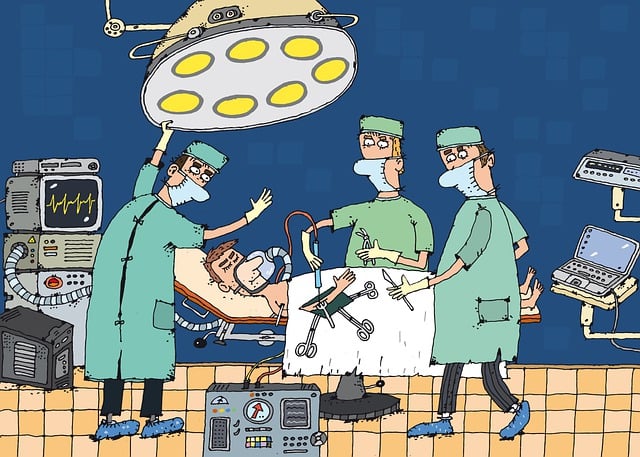Dr. Joey Cazares Leads Smile Revolution at Clinicas McAllen

Dr. Joey Cazares leads Clinicas del Dr. Cazares McAllen, a state-of-the-art dental clinic focusing o…….
In the dynamic realm of healthcare, innovative models of delivery and care management have emerged, challenging traditional norms. Among these is the concept of “Clinicas del Dr. Cazares McAllen,” a patient-centric approach that has gained significant traction, particularly in the United States and beyond. This article aims to delve into the intricacies of this healthcare model, exploring its origins, global impact, economic implications, technological innovations, regulatory landscape, challenges, and promising future prospects. By examining these aspects, we will uncover the multifaceted nature of Clinicas del Dr. Cazares McAllen and its potential to revolutionize healthcare delivery.
Definition: Clinicas del Dr. Cazares McAllen, often referred to as “McAllen Model” or “Patient-Centered Clinical Home,” is a comprehensive healthcare delivery system that emphasizes patient engagement and coordination among various healthcare providers. It was initially developed in McAllen, Texas, by Dr. Miguel A. Cazares, a visionary physician who sought to improve access, quality, and efficiency in healthcare services.
Core Components:
Patient-Centric Care: At the heart of this model lies the patient, with personalized care plans tailored to their unique needs. Patients are actively involved in decision-making processes, fostering a collaborative relationship with their healthcare team.
Integrated Care Team: The clinic brings together various healthcare professionals, including physicians, nurses, specialists, and community health workers, under one roof. This interdisciplinary approach ensures holistic care and effective communication among providers.
Comprehensive Services: Clinicas del Dr. Cazares offer a wide range of services, from primary care to specialized treatments, often within a single location. This consolidates healthcare access, reducing the need for patients to navigate multiple facilities.
Technology Integration: Utilizing digital health technologies, such as electronic health records (EHRs) and telemedicine, the model enables efficient information sharing, remote consultations, and improved patient monitoring.
Historical Context: The concept emerged in response to growing concerns about fragmented healthcare systems, long wait times, and high costs. Dr. Cazares’ vision was inspired by successful primary care models and a desire to create a more patient-focused approach. In 2011, the first Clinica del Dr. Cazares was established in McAllen, serving as a pilot project to test and refine this innovative healthcare delivery system.
Significance: This model represents a paradigm shift in healthcare, moving away from siloed specialties towards an integrated, coordinated care approach. It aims to improve patient outcomes, enhance satisfaction, and reduce healthcare disparities by providing accessible, high-quality care.
The McAllen Model has transcended geographical boundaries, capturing the attention of healthcare policymakers and providers worldwide. Its success in improving health outcomes and reducing costs has sparked interest in various regions, leading to:
Global Adoption: Several countries, including Canada, the UK, and Australia, have implemented variations of the model to address their unique healthcare challenges. For instance, the UK’s National Health Service (NHS) has introduced “Patient-Centred Clinical Homes” inspired by the McAllen approach.
Regional Variations: Different regions have adapted the model to suit local contexts. In Europe, for example, some clinics incorporate elements of the McAllen Model while incorporating existing healthcare systems, focusing on enhancing primary care capabilities.
Growing Interest in Low- and Middle-Income Countries: The World Health Organization (WHO) has recognized the potential of this model to improve healthcare delivery in resource-constrained settings. It offers a scalable solution for countries seeking to strengthen their primary care infrastructure.
The economic implications of Clinicas del Dr. Cazares McAllen are multifaceted, impacting both healthcare systems and patients.
Market Dynamics:
Increased Competition: The model introduces competition among healthcare providers, encouraging innovation and improved service quality. This can lead to more efficient allocation of resources and better value for money.
Cost Savings: By integrating care and improving patient management, the clinic may reduce overall healthcare costs. A 2018 study by the Journal of Ambulatory Care Management suggested that McAllen-style clinics could lower expenses related to readmissions and unnecessary tests.
Investment Patterns:
Private Sector Engagement: The model attracts private investments as it offers promising returns through improved patient outcomes and reduced costs. This has led to partnerships between healthcare providers, technology companies, and investors.
Government Initiatives: Many governments are supporting the adoption of such models through incentives, grants, and public-private collaborations, recognizing their potential to transform healthcare delivery.
Patient Perspective:
Technology plays a pivotal role in the success of Clinicas del Dr. Cazares McAllen, enabling efficient information exchange and enhancing patient engagement.
Electronic Health Records (EHRs): EHRs form the backbone of this model, allowing seamless sharing of patient data among providers. This reduces redundant tests and improves continuity of care.
Telemedicine: Telehealth services, including remote consultations and monitoring, expand access to care, particularly for rural or geographically distant patients. It also facilitates follow-up visits and chronic disease management.
Mobile Health (mHealth) Applications: Mobile apps enable patients to communicate with their healthcare teams, access health records, and receive reminders for medications or appointments. This fosters greater patient involvement in their care.
Artificial Intelligence (AI): AI algorithms can analyze patient data to predict health risks, suggest personalized treatment plans, and improve clinical decision-making. This technology enhances the efficiency and accuracy of healthcare delivery.
The implementation of Clinicas del Dr. Cazares McAllen is guided by various policies and regulations that vary across jurisdictions.
Key Considerations:
Licensing and Certification: Healthcare facilities adopting this model must comply with local licensing requirements, ensuring they meet specific standards for patient care and safety.
Data Privacy and Security: With increased digital health technologies, protecting patient data becomes paramount. Regulations like HIPAA (Health Insurance Portability and Accountability Act) in the US or GDPR (General Data Protection Regulation) in Europe set guidelines for secure data handling.
Reimbursement Policies: Healthcare insurers play a crucial role in shaping the model’s adoption. They must adapt reimbursement structures to accommodate integrated care teams and new service delivery models.
Legislative Frameworks: Governments worldwide are introducing or amending policies to support innovative healthcare approaches, including:
Health System Reform: Some countries have incorporated elements of the McAllen Model into broader health system reforms, aiming to improve overall population health and reduce disparities.
Primary Care Enhancement: Many policy initiatives focus on strengthening primary care, recognizing its central role in preventing diseases and managing chronic conditions, as advocated by the McAllen Model.
Despite its numerous advantages, the Clinicas del Dr. Cazares McAllen model faces several challenges and criticisms that must be addressed for sustainable implementation.
Main Issues:
Interoperability: Ensuring seamless data exchange between various healthcare systems and providers remains a significant hurdle. Standardization of health information technology is essential to facilitate efficient communication.
Workforce Capacity: Training and retaining a multidisciplinary healthcare team requires substantial investment in education, training, and incentives. Addressing workforce shortages and ensuring cultural competence among providers is crucial.
Regulatory Burdens: While regulations are necessary for patient safety, excessive paperwork and compliance requirements can hinder the clinic’s operational efficiency. Streamlining processes while maintaining quality standards is a complex task.
Community Acceptance: Gaining community trust and fostering patient engagement may be challenging in diverse cultural settings. Tailoring communication strategies to different demographics is essential for successful implementation.
Proposed Solutions:
Interoperability Standards: Developing and adopting standardized health information exchange (HIE) protocols, such as FHIR (Fast Healthcare Interoperability Resources), can facilitate data sharing across systems.
Workforce Development Programs: Governments and healthcare organizations should collaborate on training initiatives to educate and attract professionals for integrated care teams, offering incentives for specialized roles.
Simplified Regulations: Policy-makers can work towards simplifying regulatory requirements while ensuring patient safety. This could involve creating flexible frameworks that adapt to the unique needs of different healthcare delivery models.
Community Engagement Strategies: Customized outreach programs, multilingual services, and culturally sensitive care approaches can enhance community acceptance and improve patient satisfaction.
Several Clinicas del Dr. Cazares McAllen initiatives have demonstrated remarkable success, providing valuable insights into their operational strategies and outcomes.
Case Study 1: El Centro de Salud en McAllen, Texas
Overview: Established in 2011 as the original prototype, this clinic serves a diverse population with various health needs. It offers primary care, specialist services, and community outreach programs.
Achievements: Within two years of operation, the clinic achieved a 40% reduction in hospital readmissions and a 25% decrease in emergency room visits among its patient population. It has also successfully managed chronic conditions, such as diabetes and hypertension, improving overall health outcomes.
Strategies: El Centro de Salud attributes its success to strong community partnerships, patient engagement through technology, and an interdisciplinary approach to care coordination.
Case Study 2: Clinica Comunitaria en Los Angeles, California
Focus: Serving a predominantly Hispanic community, this clinic addresses cultural barriers to healthcare access. It offers a range of services, including mental health support and language interpretation.
Impact: The clinic has significantly increased enrollment in public health insurance programs and improved flu vaccination rates among eligible residents. Its patient satisfaction scores are consistently high, reflecting successful community engagement.
Approach: By employing culturally competent staff, offering translation services, and incorporating community health workers, the clinic has fostered trust and built strong relationships with its clientele.
Case Study 3: Global Implementation in Colombia
Initiative: A non-profit organization, Fundacion Clinica Cazares, introduced the model to several remote communities in Colombia, partnering with local healthcare providers.
Results: Within six months, participating clinics reported a 35% reduction in outpatient visits to emergency departments and improved vaccination coverage among children under five.
Key Factors: Success factors included local community involvement, adaptable technology solutions, and training programs for healthcare workers tailored to their specific needs and challenges.
The Clinicas del Dr. Cazares McAllen model stands at the forefront of healthcare innovation, with promising avenues for growth and development.
Potential Growth Areas:
Remote Patient Monitoring (RPM): Expanding telemedicine capabilities to include continuous monitoring of vital signs and health indicators, enabling early intervention and remote care management.
Digital Health Literacy: Investing in programs that enhance patients’ digital literacy skills, ensuring they can actively participate in their healthcare through online platforms.
Global Expansion: With successful implementations globally, further international partnerships and adaptations could lead to widespread adoption, particularly in regions with limited access to quality healthcare.
Emerging Trends:
AI-Driven Care: Integrating AI technologies for predictive analytics, personalized treatment plans, and automated administrative tasks will enhance efficiency and improve patient outcomes.
Integrated Mental Health Services: Expanding the model’s scope to include comprehensive mental health support, recognizing the interconnectedness of physical and psychological well-being.
Strategic Considerations:
Partnerships and Collaboration: Encouraging public-private partnerships can leverage resources, expertise, and innovative solutions for sustainable model implementation.
Policy Alignment: Healthcare policymakers should align regulations to support integrated care models, ensuring a conducive environment for their growth and success.
Continuous Quality Improvement: Implementing quality improvement frameworks, such as the Plan-Do-Check-Act (PDCA) cycle, allows clinics to regularly assess and enhance their service delivery.
Clinicas del Dr. Cazares McAllen represents a significant advancement in healthcare delivery, offering a patient-centric approach that improves outcomes, reduces costs, and enhances satisfaction. Its global impact and successful implementations across diverse settings underscore its potential as a universal model for high-quality, accessible care.
As the healthcare landscape continues to evolve, this innovative system positions itself at the forefront of change, challenging traditional norms and empowering patients in their health journeys. By addressing critical issues, embracing technology, and fostering collaboration, Clinicas del Dr. Cazares McAllen is poised to revolutionize healthcare delivery on a global scale, ensuring better health outcomes for all.
Q: How does the McAllen Model differ from traditional healthcare settings?
A: The McAllen Model fundamentally shifts the focus from siloed specialty care to patient-centered, integrated services. It brings together various healthcare providers under one roof, encouraging collaboration and continuous communication for comprehensive patient care.
Q: What are the economic benefits of implementing this model?
A: Clinicas del Dr. Cazares McAllen can lead to cost savings through improved patient management, reduced hospital readmissions, and more efficient use of resources. Private investments are attracted due to its promise of better value for money, while governments benefit from potential reductions in overall healthcare spending.
Q: How does technology play a role in the success of this model?
A: Technology, particularly EHRs, telemedicine, and mobile health apps, enables efficient data sharing, remote consultations, and enhanced patient engagement. These tools empower patients to take an active role in their care while improving healthcare providers’ ability to coordinate services.
Q: Are there any challenges specific to implementing this model in rural areas?
A: While the model can improve access to care in rural settings, ensuring adequate internet connectivity and telemedicine infrastructure is crucial. Training local healthcare workers to participate in integrated teams and addressing transportation barriers for patients are also essential considerations.
Q: How does patient engagement differ in this model compared to traditional care?
A: Patients are actively involved in their care through accessible health records, mobile apps, and personalized communication. They receive education and support to manage their conditions, make informed decisions, and understand their healthcare options, fostering a partnership between patients and providers.

Dr. Joey Cazares leads Clinicas del Dr. Cazares McAllen, a state-of-the-art dental clinic focusing o…….

Clinicas del Dr. Cazares McAllen offers advanced dental care with a focus on accessibility and perso…….

Clinicas del Dr. Cazares McAllen provides immediate dental care for emergencies with same-day appoin…….

Clinicas del Dr. Cazares McAllen offers advanced teeth whitening using safe gel and custom trays, pr…….

McAllen residents seeking smile enhancement find their solution at Clinicas del Dr. Cazares McAllen……..

Dental anxiety impacted by past traumas, phobias, and misinformation can be overcome at Clinicas del…….

Clinicas del Dr. Cazares McAllen revolutionizes dentistry with advanced technology and personalized…….

Clinicas del Dr. Cazares McAllen offers personalized, state-of-the-art dentistry with comprehensive…….

Clinicas del Dr. Cazares McAllen tackles dental anxiety through personalized care, soothing environm…….